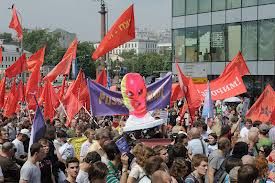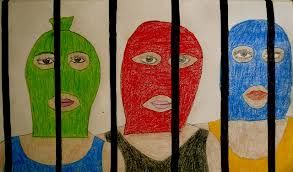
Sex
Pussy Riot and the Collective Psyche
How a powerful symbol of human rights came to be.
Posted August 20, 2012

The world is not only watching, it is convulsing
…Pussy Riot…is a form of civil action in circumstances where basic human rights, civil and political freedoms are suppressed by the corporate state system. Since the turn of the millennium many people, relentlessly and methodically flayed alive by the systematic destruction of liberties, have rebelled.
NadezhdaTolokonnikova. Closing Statement
From the viewpoint of analytic psychology, the theatre, aside from any aesthetic value, may be considered as an institution for the treatment of the mass complex.
The theatre: An institution for treatment of the mass complex

The theatre: An institution for treatment of the mass complex
Carl Jung
Psychology of the Unconsious
There is twinge of suspense in watching how the likes of Brian Williams, Piers Morgan and Soledad O’Brien manage to dignifiedly enunciate two words: Pussy Riot. On August 17, 2012 three members of the feminist punk band were brazenly sentenced by a Moscow judge to two years in prison on charges of “hooliganism motivated by religious hatred.” According to David Herzenhornm, human rights groups and Western governments immediately criticized the verdict as unjust and the sentence as unduly severe. Within hours, international news media ran feature stories and by the next day, Google had logged more than half a billion hits on Pussy Riot. David Remnick called the incident “a kind of instant classic in the anthology of dissidence.”
How can we explain the fact that a little known punk band has precipitously emerged as an international symbol for human rights? Art is a perennial vehicle for social protest, but rarely is the instantaneity and magnitude of its response so profound. The confluence of multiple schemas, deeply seated in the human mind, is the root cause of this phenomenon.
First, on a biological level, sex and aggression are closely regulated through overlapping circuits in the human brain. The synergistic effect of their vivid artistic juxtaposition, in this era of immediate verbal, acoustic and visual communication, has resulted in a sharpened focus on human rights. According to Michael Idov, “..their name, perfectly pitched to both shock and attract the western media” along with their poignantly recognizable look, coupled with intense “bursts of feminist agitprop” and their agile use of social networks “have helped make a dubious art project into a great one: one capable of changing the society that tried to stifle it.”
Not only is Russian society susceptible to recalibration, so is the world at-large.
From a radical fringe group initially formed in response to Putin’s return to the Russian presidency, they morphed into figureheads of a worldwide protest. Michelle Ringette, in her special to CNN on “Why Pussy Riot Matters” discusses how in Russia, and in places far beyond, individuals who never before paid attention to civic matters, are now stopping to converse about the importance of active political participation, and paying attention to institutions that affect their quality of life. “Punk rockers and Orthodox Christian leaders alike, emboldened by the tidal wave of global solidarity and weary of the shrinking space for expression have said enough is enough.”
The world is not only watching; it is convulsing.
Second, the advent of women explicitly owning their sexuality has come of age. Donald Liebenson notes that the "Fifty Shades" trilogy (known to some as “mommy porn”) has globally sold 31 million copies. …"Shades" and its two sequels, "Fifty Shades Darker" and "Fifty Shades Freed," have outsold all seven "Harry Potter" books.

Women are explicitly owning their sexuality
An example of active revolt against suppression of female sexuality is an international series of protests known as “SlutWalks”. These were ignited by a Toronto police officer's glib comment that women should avoid dressing like "sluts" to prevent being raped or victimized. Some protesters deliberately wear provocative or revealing outfits to bring attention to "slut-shaming” or shaming women for being sexual, and the mistreatment of sexual assault victims.
Third, ever since the 1972 terrorist attacks at the Summer Olympics in Munich, when members of the Israeli Olympic team were taken hostage and eventually killed by the Palestinian group Black September, balaclavas have become symbolic of violent terrorist activity.In the past 40 years there are few human beings who have not been psychologically damaged by the terrorist mentality.

Shining the spotlight on terrorism
By putting balaclavas in such a luminous role, Pussy Riot turns the spotlight on what is on everyone’s mind: "We need to curb the impulse to kill each other." As Konrad Lorenz wrote nearly half a century ago: “It is more than probable that the evil effects of the human aggressive drives...simply derive from the fact that in prehistoric times intra-specific selection bred into man a measure of aggression drive for which in the social order today he finds no outlet.” Until we discover means to control the biological mechanisms that regulate aggression, we will never overcome our animal heritage and become fully human.

Munich terrorist 1972
Fourth, dictatorships around the world have become the target of violent protest. As we have seen in Tunisia, Libya, Egypt, and Syria, vicious despots are being publicly eviscerated. Vladimir Putin is increasingly viewed by the international community as a tyrannical ruler. Former U.S. foreign secretary Malcolm Rifkind said the Pussy Riot verdict “creates an image of a Neanderthal country which can imprison young people for indulging in silly pranks.” Undoubtedly Putin has alienated a large percentage of Russian youth. Michelle Ringuette of Amnesty International sees the court's ruling as a "travesty". "[It] shows that the Russian authorities will stop at no end to suppress dissent and stifle civil society…Each step in the case has been an affront to human rights."
Closer to home, “Occupy Wall Street” aims to dismember the more abstract tyranny associated with corporate abuse of money and power.
Hopefully, Pussy Riot represents a positive step as we approach the long awaited turning point in the destructive nature of human affairs. Through psychobiological awareness, meaningful communication with champions for justice and equality, and a universal outcry against oppression of all kinds, a new era of human dignity may prevail.
Additional Reading
1. Herzenhornm, D. (August 17, 2012). Anti-Putin Stunt Earns Punk Band Two Years in Jail. New York Times: http://www.nytimes.com/2012/08/18/world/europe/suspense-ahead-of-verdic…
2. Remnick, D. (August 11, 2012). The Pussy Riot Scandal. The New Yorker: http://www.newyorker.com/online/blogs/newsdesk/2012/08/the-pussy-riot-s…
3. Idov, M. (August 17, 2012). Pussy Riot prove the only professionals in sight. The Guardian: http://www.guardian.co.uk/commentisfree/2012/aug/17/pussy-riot-only-pro… by
4. Ringuettte, M. (August 17, 2012). Why Pussy Riot matters. Special to CNN:
http://globalpublicsquare.blogs.cnn.com/2012/08/17/why-pussy-riot-matte…
5. Liebenson, D. (August 18, 2012). Is it an earthquake, or simply a shock? Chicago Tribune Feature Section:http://articles.chicagotribune.com/2012-08-17/features/ct-prj-0819-fift…
6. Konrad Lorenz. On Aggression (1966) (Das sogenannte Böse. Zur Naturgeschichte der Agression, 1963)
7. Elder, M.(August 18, 2012). Pussy Riot trial gives Russia 'the image of a medieval dictatorship'. The Guardian:http://www.guardian.co.uk/world/2012/aug/18/pussy-riot-russia-global-pr…



